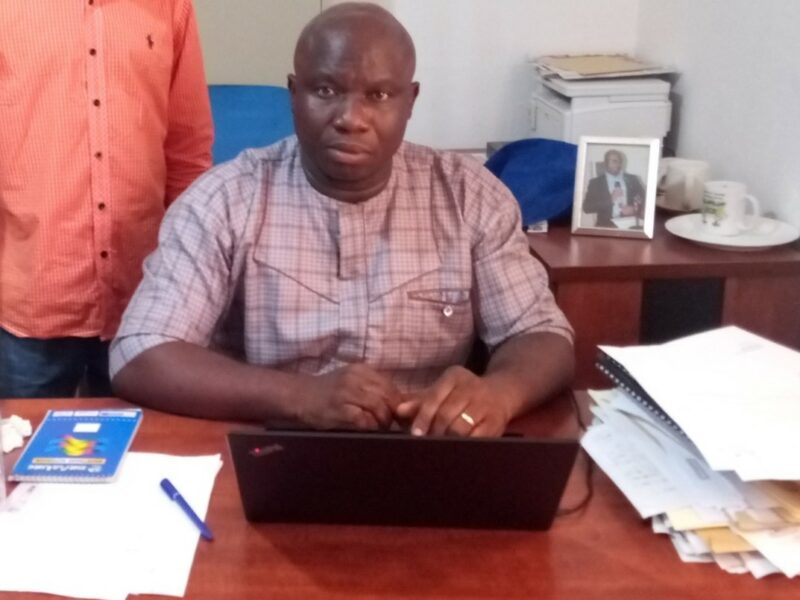Walking the talk this time: abolishing the death penalty in Sierra Leone
As the botched execution of United States citizen, Clayton Lockett reignites the global debate on the application of the death penalty, Sierra Leone’s Attorney General and Minster of Justice has made a public commitment to the Committee overseeing the Convention against Torture on behalf of the government. The country will abolish the death penalty as a form of punishment “in the space of a few weeks”. (Photo: Sonkita Conteh, author)
In his statement of 2 May 2014 to the Committee, during a public hearing on the country’s initial report which was due in 2002, the Minister stated that Sierra Leone was already a defacto abolitionist state. Giving an overview of progress made in implementing the convention, he reported that the President had during a national event commuted all death sentences to life imprisonment. His office, according to him had received direction from the Presidency to develop legislation “as a matter of urgency” to remove the death penalty from the country’s laws. As part of his progress report, the Attorney General informed the torture watchdog that the government has presented a new Criminal Procedure bill to parliament for enactment. When passed, the law would simplify and speed up criminal trials and provide for alternative sentencing.
This commitment to abolish the death penalty would seem to validate years of advocacy by civil society organisations both within and outside the country. Sierra Leone is a party to the International Covenant on Civil and Political Rights and its first optional protocol, but the country has not signed up to the second optional protocol which aims at the abolition of the death penalty by member states.
As important as this public expression of commitment is, many jaded campaigners may not be impressed. This is not the first time that the government has made such a public commitment to abolish the death penalty. It made a similar one in 2011 during Sierra Leone’s Universal Periodic Review by the Human Rights Council. What might be different this time perhaps is the allusion to a short albeit uncertain time span within which the action would be done rather than an open-ended promise. Even with this hopeful view, we might still have to wait many months yet for a final de jure removal of the death penalty from our laws.
Sierra Leone is currently reviewing its 1991 constitution, a process likely to last for about two years. Section 16 (contained in chapter 3 of the constitution) provides for the application of the death penalty as a form of punishment and an exception to the right to life. The entire chapter three of the constitution also known as the bill of rights is an entrenched clause. This means that none of its provisions could be ordinarily amended by a vote in parliament. It would require a referendum to be conducted in addition to a vote in parliament. Removal of the death penalty provision from the constitution would therefore have to be done within the framework of the general constitutional review which is now ongoing.
As this process tackles a wide range of issues, it is important that both government and abolitionist civil society organisations continue to keep the death penalty sharply in focus as many issues compete for the attention of the review committee.
Nevertheless, there is something the government could do now to ‘action’ this public pronouncement on the death penalty and lay the ghost of an unfulfilled promise to rest. It could remove all references to the death penalty as a form of punishment in existing statutes ‘within the space of a few weeks’. The government could start with the draft criminal procedure bill which is to be laid before parliament. This draft bill currently contains 19 provisions (section 221-239) on the application of the death penalty, covering matters such as the method of execution and the form and substance of the ‘death warrant’ which is issued by the president. All of these sections should be expunged from the bill.
The government could then proceed to review the Treason and State Offences Act 1963 as amended, the Offences against the Person Act 1861, the Larceny Act 1916 as amended and the Sierra Leone Military Forces Act 1961 which make the four capital offences namely, treason, murder robbery with aggravation and mutiny punishable by death. Given the earlier action of the President, the death penalty may well be substituted with a life imprisonment sentence.
In a country with enormous challenges to criminal justice delivery, abolishing the death penalty is a real safeguard. Miscarriages of justice leading to its imposition are irreversible. With its elimination, that would no longer be the case. Action must now follow words.
By Sonkita Conteh, Director, Namati Sierra Leone
Stay with Sierra Express Media, for your trusted place in news!
© 2014, https:. All rights reserved.






